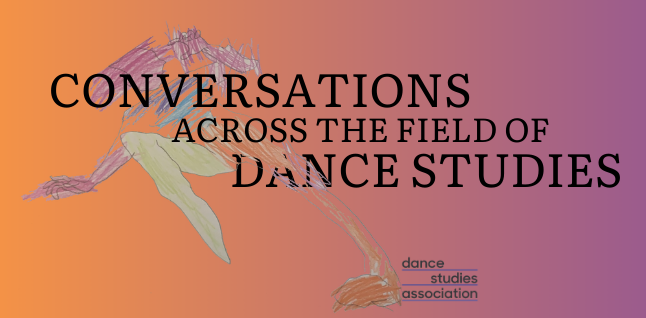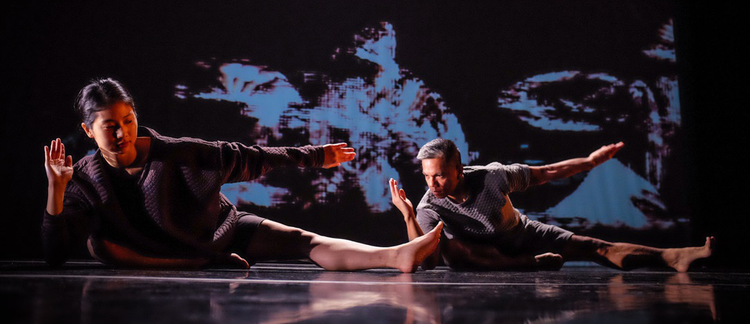Violence against Asian Americans, especially Asian American women, is not new, but global events have led to the resurgence of public displays of anti-Asian sentiment. For me, the aftermath of the 2021 mass shooting in Atlanta forced me to reconcile with the anxiety of being and “performing” my Asian-ness in public. Now, we must carry the trauma of being afraid of our bodies, the worry for our mothers and family members, and the reality that our existence is once again met with resistance.
As a mixed-race Cambodian American dancer and performing artist, my body has always been a complicated source of contention—neither Cambodian enough for Cambodian dance, nor legibly “American” enough for commercial success. Racialized notions of Asian bodies in dance have contributed to skewed notions of belonging and acceptance, and therefore have complicated identity politics for mixed-race artists like myself. I have spent my life in art forms that have asked me to manipulate my body to fit into an accepted aesthetic. Has my body ever been my own? Have I been performing “me,” or have I been performing how “they” see me?
Daily instances of racialized violence—racist Zoom bombings, microaggressions, deportations, displacements, and deaths that we learn about in the media—put my emotions into overdrive until I can no longer feel. In this time when we find ourselves fighting against hegemonic notions of belonging, how do we fight the anesthetizing stress of race-based violence?
“Is My Body My Own?” is a recorded poetry piece featuring instrumental music from my 2020 Album Cambodian Child.
Instrumentals: “My Neary Chea Chour (Intro),”1 “Qnoum Kaun Khmer,”2 and “For Her.”
(Full Audio Transcript Below)
Is My Body My Own?
(Audio: Footsteps. Footsteps stop.)
Should I be wearing this?
(Audio: Footsteps walking away)
(Music: “My Neary Chea Chour (Intro)”)
We didn’t ask for these bodies
We didn’t ask to be born into an American dream crafted upon the exploi-
tation of our lives—
Fodder for the imagination of self-righteous Beauregards—
white whales and blowhards…
But here we are…
So, for a fleeting moment I thought to hide,
Camouflaged amongst the quotidian
Blending in on stage like an obedient shadow…
Hiding my body in plain sight.
“Don’t forget you are half,” they remind me…
Like I ever forget.
Foolish to think I can hide in this time when a graphic tee can out me.
“Raised by Refugees,” “It’s an Honor just to be… ,” BLM and Yellow P…
My pride tucked in the back of my dresser until—until I ask…
(Music: Transition to “Qnoum Kaun Khmer”)
Is my body my own?
It fights expectations, assumptions, preferences, patriarchy, society…
Or is it a vessel for their work?
Possessed by their choreography
Claiming my body with their stage
When I dance for them, is my body still mine?
Is my body my own when I feel invisible?
When they see me but are unable to perceive where I fit…
Is it mine even when I am imperceptible?
Is not my body disowned?
Failing to speak when I beg it to.
(Music: Transition to “For Her”)
Curbing the expectations of identification
I am barred from community
Until I don emblems of my heritage,
Until I move like an ethereal memory
Until I speak clearly … chabah
Poised and beautiful…
But poisoned by growth
Then, I ask myself:
“When is my body my own?”
Maybe when I’m alone…
In my head…
Too much in my head
Heart racing
My body breaks down as my demons consume me…
Alone we mourn
To claim our bodies
To lay claim to our bodies
We must draw—
From ourselves
So, at some point, I should probably stop gaslighting myself…
Embarrassed of how they perceive me, I imagine a simpler past
Tricking myself to believe my defaults are my own fault
That my discomfort was only anxiety
Inventing for myself the romance of belonging
But then, I get checked by reality.
Full-blown decked across the face
Remembering that they don’t think I deserve to be in control … of my … own…
Here I go again… (Strength is so fickle)
“Did they?” I ask myself, “Am I being too sensitive?”
And I remember… . “Stop gaslighting yourself.”
You cannot hide from reality.
So, I face it.
We must face it.
Constantly comparing atrocities like one is “worse” than the other
But TRAUMA is how they take our bodies away from us.
Terrorizing us is how they stake their claim.
Deciding our lives are disposable—
One time use—waste…
Green-washing our stories, histories … to prop up their fantasies
Their eccentricities—
No, no, no… . So, so tired
Yet, I will fight
with the modicum of energy left in my soul
I will do what I can to reclaim my body … my being.
Despite what they THINK they know
I grow like a weed.
All I can do is live life in my body
All I must do is have joy in my body—
(laughs)
Like it or not…
Today, my body is my own.
End
Notes
- “Neary Chea Chour” is a Cambodian Classical dance piece featuring song lyrics about beautiful young women dancing in a row. “My Neary Chea Chour (Intro)” is my own version of the song’s first verse. This piece is the prelude to “My Neary Chea Chour” which features a feminist critique of an Orientalist male gaze. [^]
- “Qnoum Kaun Khmer” (Khmer) translates to “I am a Cambodian child” (English). [^]
Author Biography
Tiffany Lytle is a performing artist and scholar whose work engages with transgenerational memory, cultural identity, and multiraciality in the Cambodian American diaspora. She is an alumnus of University of California, Los Angeles’s (UCLA’s) Asian American Studies Master of Arts program and UCLA’s Southeast Asian Studies Bachelor of Arts program. Lytle is currently a PhD candidate of Theater Dance and Performance Studies at University of California Santa Barbara (UCSB). Lytle also teaches courses in UCSB’s Asian American Studies department. Her essay “Cambodian Classical Dance: Authenticity, Affect, and Exclusion” is published in a collection by University of Hawaii Press entitled California Dreaming: Movement and Place in the Asian American Imaginary (2020).
Lytle grew up performing Cambodian classical dance and was a dancer in the Los Angeles-based dance company KPA Fusion Dance Repertoire. In 2018, she and her team of dancers and musicians performed in Refugee Re/Enactments as part of UCLA’s Campus as Canvas Arts Initiative and then in “Qnoum Kaun Khmer/I AM a Cambodian Child” which premiered at Highways Performance Space. In 2019 Lytle became a Critical Refugee Studies Collective grantee, completing her 2020 single “Justice,” which reckons with global responses to the Cambodian genocide. Her album Cambodian Child is available on iTunes, Spotify, and all music-streaming platforms.

